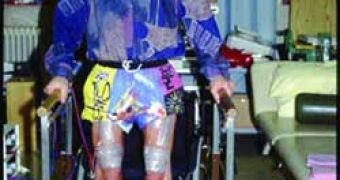Paralysis can keep people prisoners of their own bodies. It disables physically and mentally. Now, a new research at Northwestern University in Evanston, Illinois, comes with great hope for paralyzed humans.
A simple injection of biodegradable soap-like molecules triggered in six weeks nerve regeneration, correlated with some regained ability to walk in paralyzed lab rodents with spinal cord injuries.
"It will take a long time, but we want to offer at least some improvement, to improve quality of life for people with these injuries. Anything would be considered a breakthrough, because there's nothing right now." materials scientist Samuel Stupp told LiveScience.
The active factor of the shot is laminin, a protein crucial for brain development. Laminin reacts with body chemicals, assembling themselves rapidly into scaffolds of super-thin fibers (6 microns wide), which dissolve in 8 weeks.
The research was done on dozens of mice and rats with spinal cord injuries that paralyzed their hind legs, "the kind of very hard blow people might experience after falling off skiing slopes or getting in car accidents," said Stupp.
"There's a special scale to monitor how much function they regained, ranging from 0 to 21. At 21, function is perfect. At 6 or 7, limbs are just paralyzed, and the mice were just dragging them along. If you go to 9 to 12, the animal can now actually move the limbs. Not perfectly-awkwardly-but they move." said Stupp. "We've been able to go from a 7 to a 9 in the mouse, and in the rat, the highest was 12," he said.
"The researchers are currently in talks with the FDA regarding their work and hope to start phase I clinical trials (for toxicity and safety testing) in humans two years from now," Stupp said.
The shot should be administered to the patients within a day or so after spinal cord injuries, before scar tissue starts forming, as they turn neural stem cells into neurons (otherwise they transform into scar cells at an injury place).
"Recovering every function a person had before an injury will probably be very hard. Even if people couldn't walk, if they could recover bladder function, that'd be a good thing. It's the first thing I'd want to recover." said Stupp.
Similar molecules will be investigated for Parkinson's disease, stroke, heart attacks, bone trauma or diabetes.

 14 DAY TRIAL //
14 DAY TRIAL //